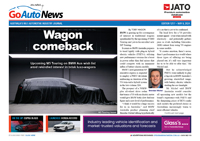Make / Model Search
News - General NewsBattery swaps back on… for ChinaEleven Chinese cities selected for pilot electric vehicle battery swap program4 Nov 2021 By MATT BROGAN CHINA will pilot a program that will attempt to revive an electric vehicle battery swap system similar to that trialled by EV infrastructure provider Better Place back in 2011.
The Chinese program follows similar principles to those demonstrated by the earlier Renault/Better Place model with 1000 stations to be rolled out in 11 major cities over the coming months.
China’s Ministry of Industry and Information Technology, which regulates the country’s automotive industry, says the program will add to the already 900 battery swap stations that have been built across the country, but will offer common technical standards and payment systems to streamline the system for users.
Of the cities selected to participate in the program, eight (Beijing, Changchun, Chongqing, Hefei, Ji’nan, Nanjing, Sanya, and Wuhan) will service “a comprehensive range” of passenger and light commercial vehicles with the remaining three (Baotou, Tangshan, and Yibin) to construct battery swap stations for heavy-duty trucks.
The MIIT said the program will provide shared information and operating results with other cities looking to construct and operate such facilities, though it is not clear if the sharing of intellectual property applies only within China or will be shared globally.
Better Place “indefinitely postponed” the rollout of its EV battery swap model globally after trials in Denmark and Israel lost the company “somewhere in the order of US$500 million” (AUD$665 million).
Despite generous tax incentives in Denmark and crippling fuel costs in Israel, the trial – which also required more than 10,000 compatible Renault-Nissan vehicles to be produced – was an utter failure because, according to then vice president of business development for Better Place, David Jones, electric cars are “not convenient” and “not affordable”.
The company’s battery swapping technology had planned to reduce ownership costs of electric vehicles by as much as 20 per cent, however those projections never came close to materialising, and after just five years in the limelight, Better Place filed for bankruptcy in 2013. Just 1400 battery-swap-compatible Renault Fluence Z.E. cars were produced in total.
Similar swap-and-go models have been trailed more successfully in two-wheel applications with companies including Taiwan’s Gogoro showing the how an urban battery-swapping program can work on a large scale. The company introduced the world’s first totally integrated battery exchange for scooters in 2015 and has since delivered over 180 million battery swaps to its 375,000 subscribers.
The company estimates its smart charging and battery exchange program has saved over 270 million kilograms of CO2 from entering the atmosphere and says its subscribers have ridden more than 3.3 billion kilometres in aggregate.
The model shows what is possible from a successful battery swap program, the Chinese trail expected to be the largest, and arguably most relevant, of its type as the world seeks to rapidly electrify its fleet of internal combustion powered cars, buses, and trucks.
 Read more13th of December 2012  Renault puts indefinite halt on Fluence ZE in AustraliaBetter Place battery-swap stations up to 12 months off, Renault postpones Fluence ZE |
Click to shareGeneral News articlesResearch General News Motor industry news |











Facebook Twitter Instagram